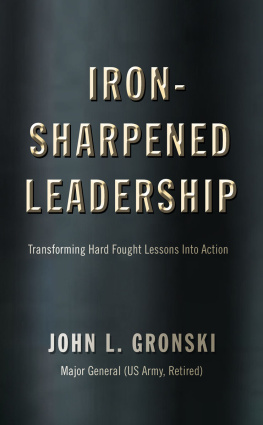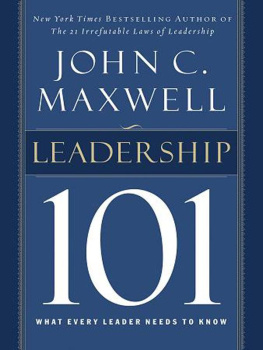Other titles in the Briefcase Books Series include:
Communicating Effectively by Lani Arredondo
Performance Management by Robert Bacal
Recognizing and Rewarding Employees by R. Brayton Bowen
Motivating Employees by Anne Bruce and James S. Pepitone
Effective Coaching by Marshall J. Cook
Conflict Resolution by Daniel Dana
Managing Teams by Lawrence Holpp
Hiring Great People by Kevin C. Klinvex, Matthew S. OConnell, and Christopher P. Klinvex
Empowering Employees by Kenneth L. Murrell and Mimi Meredith
The Managers Guide to Business Writing by Suzanne D. Sparks
Skills for New Managers by Morey Stettner
To learn more about titles in the Briefcase Books series go to www.briefcasebooks.com
Youll find the tables of contents, downloadable sample chapters, information on the authors, discussion guides for using these books in training programs, and more.


Copyright 2000 by The McGraw-Hill Companies, Inc. All rights reserved. Except as permitted under the United States Copyright Act of 1976, no part of this publication may be reproduced or distributed in any form or by any means, or stored in a database or retrieval system, without the prior written permission of the publisher.
ISBN: 978-0-07-139961-6
MHID: 0-07-139961-5
The material in this eBook also appears in the print version of this title: ISBN: 978-0-07-136430-0, MHID: 0-07-136430-7.
All trademarks are trademarks of their respective owners. Rather than put a trademark symbol after every occurrence of a trademarked name, we use names in an editorial fashion only, and to the benefit of the trademark owner, with no intention of infringement of the trademark. Where such designations appear in this book, they have been printed with initial caps.
McGraw-Hill eBooks are available at special quantity discounts to use as premiums and sales promotions, or for use in corporate training programs. To contact a representative please e-mail us at bulksales@mcgraw-hill.com.
This publication is designed to provide accurate and authoritative information in regard to the subject matter covered. It is sold with the understanding that neither the author nor the publisher is engaged in rendering legal, accounting, or other professional service. If legal advice or other expert assistance is required, the services of a competent professional person should be sought.
From a Declaration of Principles jointly adopted by a Committee of the American Bar Association and a Committee of Publishers
TERMS OF USE
This is a copyrighted work and The McGraw-Hill Companies, Inc. (McGraw-Hill) and its licensors reserve all rights in and to the work. Use of this work is subject to these terms. Except as permitted under the Copyright Act of 1976 and the right to store and retrieve one copy of the work, you may not decompile, disassemble, reverse engineer, reproduce, modify, create derivative works based upon, transmit, distribute, disseminate, sell, publish or sublicense the work or any part of it without McGraw-Hills prior consent. You may use the work for your own noncommercial and personal use; any other use of the work is strictly prohibited. Your right to use the work may be terminated if you fail to comply with these terms.
THE WORK IS PROVIDED AS IS. McGRAW-HILL AND ITS LICENSORS MAKE NO GUARANTEES OR WARRANTIES AS TO THE ACCURACY, ADEQUACY OR COMPLETENESS OF OR RESULTS TO BE OBTAINED FROM USING THE WORK, INCLUDING ANY INFORMATION THAT CAN BE ACCESSED THROUGH THE WORK VIA HYPERLINK OR OTHERWISE, AND EXPRESSLY DISCLAIM ANY WARRANTY, EXPRESS OR IMPLIED, INCLUDING BUT NOT LIMITED TO IMPLIED WARRANTIES OF MERCHANTABILITY OR FITNESS FOR A PARTICULAR PURPOSE. McGraw-Hill and its licensors do not warrant or guarantee that the functions contained in the work will meet your requirements or that its operation will be uninterrupted or error free. Neither McGraw-Hill nor its licensors shall be liable to you or anyone else for any inaccuracy, error or omission, regardless of cause, in the work or for any damages resulting therefrom. McGraw-Hill has no responsibility for the content of any information accessed through the work. Under no circumstances shall McGraw-Hill and/or its licensors be liable for any indirect, incidental, special, punitive, consequential or similar damages that result from the use of or inability to use the work, even if any of them has been advised of the possibility of such damages. This limitation of liability shall apply to any claim or cause whatsoever whether such claim or cause arises in contract, tort or otherwise.
Contents
Preface
Leadership Skills for Managers is written for the reader who wishes to develop his or her leadership skills. Typically, managers seek such development. In truth, though, anyone can be a leader. Consequently, this book provides a balanced approach: if you want to learn more about management theory, the experts are cited, common wisdom is shared, and best practices are encouraged. And if you want to develop leadership skills, regardless of your place in the organization, tools are presented, examples are given, and first steps are laid out. But if you want to hone both management and leadership skills, the numerous assessments and exercises are designed to enhance your overall competence and to help you move effortlessly into situations that call for one or the other set of skills.
The material in this book should speak to youin clear, uncomplicated, uncompromising language, the kind of language that leaders employ. The examples should inspire you, the exercises should challenge you, and the information should make you think about the significant responsibilities that leaders assume.
Plan of the Book
The first chapter distinguishes between the functions of leaders and managers, and then goes on to examine the traits typically associated with leadership. The remaining chapters explore the various roles leaders are expected to play and hats theyre expected to wear. Among them are the visionarys, the problem-solvers, the team-builders, and the managers. In addition, leaders are expected to be outstanding communicators, power-distributors, and liaisons. Finally, they are asked to plan and to learn to integrate the many skills ultimately required to facilitate the success of others.
Special Features of this Book
In addition to assessments, exercises, quizzes, and examples, this book has a unique set of sidebars: smart managing tips, tools, tricks of the trade, definitions, cautions, hints to avoid making mistakes, and examplesall of which illustrate the points being made. Lending depth and richness to the textual tapestry, these special notes will help you absorb and remember the key points made.
Management guru Peter Drucker maintains that action without thinking is the cause of every failure. Leadership will provoke your thoughts and in so doing will help distance you from failure as you move closer and faster toward success.

Next page











